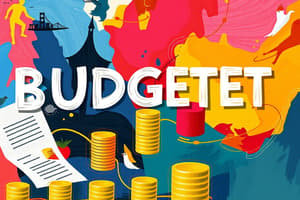Podcast
Questions and Answers
What is the main purpose of a budget within an organization?
What is the main purpose of a budget within an organization?
- To increase the number of employees
- To avoid planning altogether
- To set financial and operational goals for a specific period (correct)
- To eliminate all costs
Behavioral aspects of budgeting do not affect employee performance.
Behavioral aspects of budgeting do not affect employee performance.
False (B)
What is the typical time frame for strategic planning?
What is the typical time frame for strategic planning?
3–5 years
A budget is a quantitative expression of an entity's ________.
A budget is a quantitative expression of an entity's ________.
Match the following budget types with their descriptions:
Match the following budget types with their descriptions:
Which of the following is NOT a method to reduce cash outflow?
Which of the following is NOT a method to reduce cash outflow?
In a participative budgeting style, unit managers have no input into the targets set.
In a participative budgeting style, unit managers have no input into the targets set.
What is a master budget commonly classified into?
What is a master budget commonly classified into?
Excess inventory ties up cash and often adds to ______ and handling costs.
Excess inventory ties up cash and often adds to ______ and handling costs.
Match the types of budgeting styles with their characteristics:
Match the types of budgeting styles with their characteristics:
What factor best motivates a manager regarding budget targets?
What factor best motivates a manager regarding budget targets?
Challenging budget targets can demotivate managers if they perceive them as unattainable.
Challenging budget targets can demotivate managers if they perceive them as unattainable.
What is one strategy to improve cash flow?
What is one strategy to improve cash flow?
What is a primary purpose of a sales budget?
What is a primary purpose of a sales budget?
The budgeting process includes monitoring actual performance against the budget throughout the budget period.
The budgeting process includes monitoring actual performance against the budget throughout the budget period.
Name one way budgeting helps in decision making.
Name one way budgeting helps in decision making.
The ______ budget involves preparing departmental expense budgets.
The ______ budget involves preparing departmental expense budgets.
Match the type of budget with its primary function:
Match the type of budget with its primary function:
Which step comes first in the budgeting process?
Which step comes first in the budgeting process?
Improving cash flow strategies is unrelated to the budgeting process.
Improving cash flow strategies is unrelated to the budgeting process.
What is essential for successful budget preparation according to Simons (2000)?
What is essential for successful budget preparation according to Simons (2000)?
Flashcards
Cash outflow reduction
Cash outflow reduction
Methods to decrease the amount of cash leaving a business, including cutting expenses, using creditor terms, managing inventory, deferring capital expenditures, and reducing carbon footprint.
Behavioral budgeting
Behavioral budgeting
Examines how budgeting processes affect manager behavior, motivation, and decision-making.
Authoritarian budgeting
Authoritarian budgeting
Senior management sets targets and budgets without significant input from unit managers.
Participative budgeting
Participative budgeting
Signup and view all the flashcards
Motivational budget targets
Motivational budget targets
Signup and view all the flashcards
Master budget
Master budget
Signup and view all the flashcards
Strategic planning
Strategic planning
Signup and view all the flashcards
Operating budgets
Operating budgets
Signup and view all the flashcards
Financial budgets
Financial budgets
Signup and view all the flashcards
Budgeting's Role in Decision Making
Budgeting's Role in Decision Making
Signup and view all the flashcards
Budget Purpose
Budget Purpose
Signup and view all the flashcards
Sales Budget
Sales Budget
Signup and view all the flashcards
Operating Budget
Operating Budget
Signup and view all the flashcards
Production/Inventory Budget (Manufacturing)
Production/Inventory Budget (Manufacturing)
Signup and view all the flashcards
Purchases Budget
Purchases Budget
Signup and view all the flashcards
Budgeting Process: Steps
Budgeting Process: Steps
Signup and view all the flashcards
Budgeting
Budgeting
Signup and view all the flashcards
Strategic Planning
Strategic Planning
Signup and view all the flashcards
Budget
Budget
Signup and view all the flashcards
Master Budget
Master Budget
Signup and view all the flashcards
Operational Plans
Operational Plans
Signup and view all the flashcards
Performance Management
Performance Management
Signup and view all the flashcards
Study Notes
Chapter 9: Budgeting
- Budgeting is a process focusing on the short term (typically one year), creating financial frameworks for that period.
- Budgets operationalize strategic plans, allowing operational areas to understand their contribution to the entity's strategic objectives.
- Strategic planning concerns longer-term planning (typically 3-5 years); it's usually carried out by senior management and relates to broader business issues such as takeovers, expansion, segment deletion, or radical product/service development.
Learning Objectives
- Understand the importance of planning and budgeting.
- Explain what a budget is and describe key budgeting process steps.
- Explain different budget types.
- Outline master budget components and prepare a master budget.
- Prepare a schedule of receipts from accounts receivable and a cash budget.
- Explain budgeting's use in planning and control.
- Discuss issues associated with budgeting's behavioral aspects.
Strategic Planning and Budgeting
- A budget is a quantitative expression of an entity's plans.
- Budgeting supports decision-making with longer-term plan implementation, strategic plan feasibility assessment, manager target setting, resource constraints identification, anticipated cash shortages/excesses, and short-term planning.
- Budgets provide profit forecasts and financial data to capital markets and predict activity levels based on sales/fees.
- They aid in determining inventory/purchasing needs for raw materials, labor/input planning, and evaluating financing commitments.
Budget Cycle
- The budget cycle incorporates:
- Evaluating and rewarding performance
- Investigating differences between actual and budget results
- Reassessing vision and core competencies
- Reconsidering long-term strategies
- Developing operating plans
- Translating strategies and operating plans into a master budget
- Monitoring actual results compared to the budget
Budgets
- Entities engage in a planning process requiring involvement in a budgeting process.
- Budgeting is part of the formal planning process, relating to operational plans, including short-term goals and targets.
- Performance management involves setting targets beyond financial terms (e.g. customer service improvements, corporate governance, and human resource management techniques).
The Budgeting Process
- Evaluating past performance, adjusting to expectations, creating estimates, monitoring performance, and adjusting budgets based on changing circumstances are vital aspects.
- The budgeting process involves a series of steps including:
- Consideration of past performance
- Assessment of expected trading/operating conditions
- Initial budget estimates preparation
- Adjustments based on manager communication/feedback
- Preparation of reports/sub-budgets
- Monitoring actual performance against the budget and
- Necessary budget adjustments throughout the period.
The Budgeting Process (Communication)
- Throughout the process, communication with affected managers is critical.
- Entity personnel collaboration is necessary to create a profit plan for the coming year.
- Interactions help personnel understand decisions' impact and value creation for the entity.
Types of Budgets
- Sales (or fees) budget: Sets expected activity levels.
- Operating (expenses) budget: Often departmental expense budgets.
- Production and inventory budgets: Used for planning production/managing inventory levels, including sub-budgets for direct materials, direct labor, and indirect costs.
- Purchases budget: Determines the required inventory/direct material purchases based on the sales budget and/or production/inventory budgets.
- Manufacturing overhead budget: Focuses on estimating overheads/expenses from production activities.
- Budgeted statement of profit or loss: Aggregates other sub-budgets (sales, operating expenses).
- Cash budget: Forecasts future cash receipts and payments.
- Budgeted statement of financial position: Shows assets and liabilities at the end of the period.
- Capital budget: Focuses on expenditure for long-term investments.
- Program budget: Commonly used in governments/not-for-profit sectors, focusing on program-related costs.
Applicable Budgets for Entities
- Presents sample budgets for manufacturers, service organizations (e.g. hotels), professional service entities (e.g. accounting firms), and government departments.
Example – Production Budget
- X-treme Bike Ltd (example):
- Expected to sell 25,000 electronic bicycles.
- Beginning and ending inventory are 2,000 and 3,500 units respectively.
- Required: Prepare production budget for next year.
Example – Direct Material Budget
- East Mountain Bike (example):
- Shows the process to calculate cost of direct materials to purchase for planned production next year.
Example – Cash Collection Budget
- E-Macc Manufacturing Company (example):
- Creates a multi-period cash collection schedule for the next quarter.
Master Budget
- A master budget is a set of interrelated budgets outlining and providing a framework for viewing relevant budgets for a future period.
- It acts as a control tool for monitoring entity achievements.
- Items in a master budget should mirror the entity's chart of accounts.
- The chart of accounts is a listing/index that guides classification and recording of transactions within the financial reporting system.
Master Budget (Variances)
- Budgets use forecasts, making complete accuracy impossible; variances (differences between actual and budgeted results) are inevitable.
- Variances can be favorable (when actual revenues exceed budgeted revenues or costs are less than budgeted costs) or unfavorable (when actual revenues are lower than budgeted revenues or costs are higher).
Master Budget (Structure)
- The master budget includes operating and financial budgets.
- The master budget includes budget assumptions and various detailed budgets.
- Operating budgets include those used for a service entity(e.g. sales budgeting which requires market analysis to identify customer demand) as well as those needed for manufacturing entities (e.g. production, materials, labor, production overhead, selling and administrative).
- Financial budgets include cash budgets and capital expenditure budgets.
The Cash Budget
- The cash budget is a statement of future cash receipts and payments.
- It aids in decision-making by:
- Documenting all cash receipts and payments.
- Identifying periods of potential cash shortages/surpluses.
- Identifying suitable times for purchasing non-current assets.
- It involves calculating cash receipts from credit sales/fees.
- Cash collection schedules are used in preparing cash budgets.
Budgets: Planning and Control
- The cash budget is an essential component of the planning process.
- It is used for monitoring cash performance, which is also called the control process.
- A month-by-month cash budget provides greater utility than quarterly or yearly ones.
- Actual cash numbers are compared to budget numbers monthly to identify variances.
Variance Report (Example)
- Presents an example variance report for a cash budget, calculating variances for January 2022.
Improving Cash Flow
- Cash inflow can be increased by improving collections from debtors, increasing sales, reducing inventory, securing external finance, increasing owner contributions/ownership restructuring, and selling excess non-current assets.
- Cash outflow can be decreased by reducing expenses (waste, duplication, inefficiency), using creditor terms, managing inventory levels, deferring capital expenditures, and reducing the carbon footprint.
Behavioral Aspects of Budgeting
- The behavioral aspect explores how budgeting process "style" (e.g. participation level by managers) and budget targets affect manager behavior, motivation, and decision-making.
- Two key areas are:
- The budgeting process style.
- The impact of targets and plans on behaviour.
Styles of Budgeting
- Authoritarian style: Senior management sets targets and budgets; unit managers have limited involvement.
- Participative style: Targets/budgets are set through discussion and negotiations between senior management and unit managers; unit managers have more involvement.
Effect of Budget Targets on Behavior
- Manager motivation regarding budget targets is affected by several factors, including whether the targets are attainable, the manager's sense of ownership, their ability to control factors influencing target achievement, and the comprehensiveness of budget estimations.
Summary
- Strategic planning influences shorter-term budgetary planning.
- A master budget is a set of related budgets for the future.
- Master budgets are typically classified as operating and financial budgets.
- Behavioral aspects of budgeting relate to human involvement in decision-making.
Studying That Suits You
Use AI to generate personalized quizzes and flashcards to suit your learning preferences.




